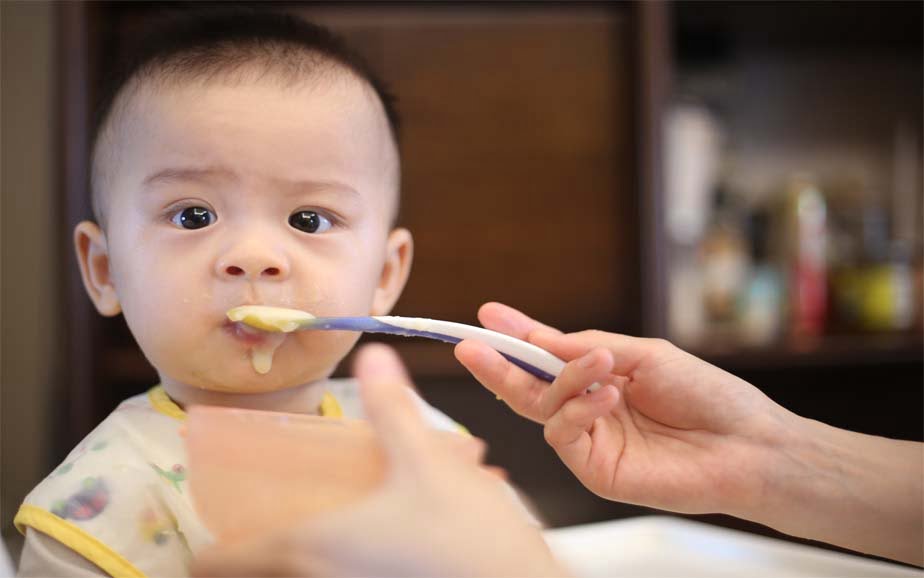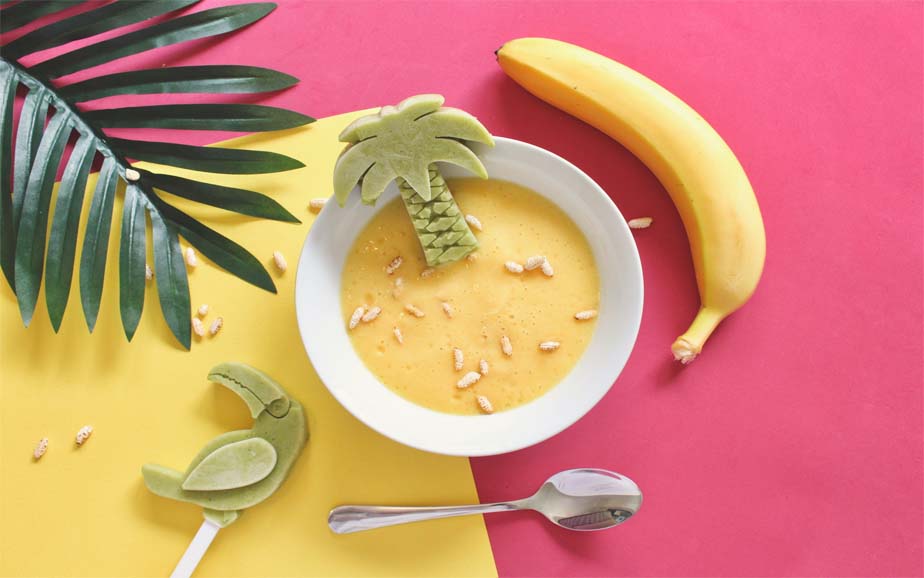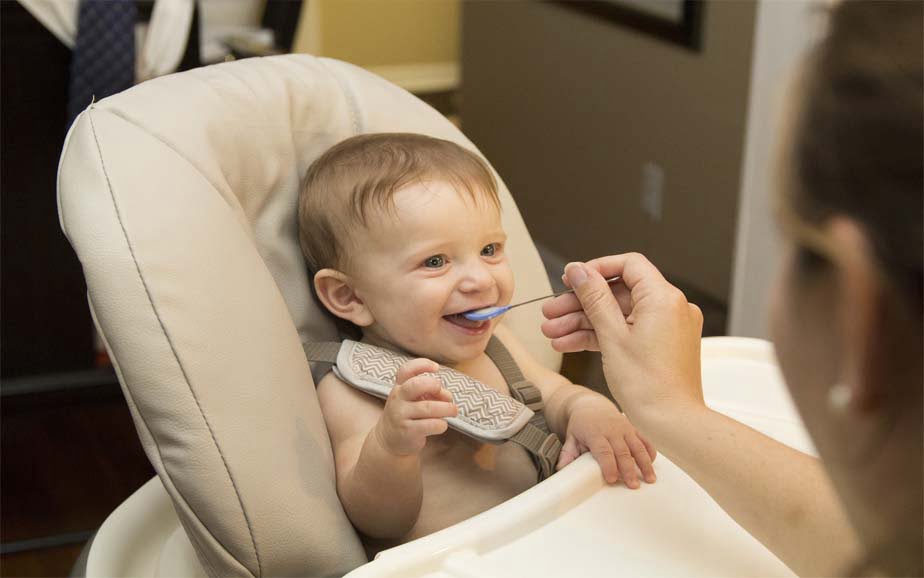Babies are a precious gift to the parents and their health is a much needed concern to their mom and dad. Hence, the choice of foods decide the source of the baby’s nutrition. Different types of wholesome food for baby are introduced at the different stages during the first 12 months. In the article we have provided an accurate chart of wholesome foods for babies of 6 to 12 months old. This would let you understand the baby’s food choice at the different stages. Along with that we have discussed the foods which need to be avoided during these stages.
At what age can babies have baby food?
What age to start baby food? This question has many answers as this mostly depends on the baby’s behavior and the signs of readiness. As per many pediatricians and also by the AAP the age to start solid food for babies is at 6th month. It is recommended by many pediatricians to feed breast milk until the baby is 6 months old. However in a few cases baby can show a few signs of readiness which encourages parents to introduce solids even before the baby becomes 6 months old. In few cases pediatricians may say ok on starting baby food at 4 months where the baby shows the signs of readiness, such as; the baby can hold his/her head up, opens mouth when food comes their way, Brings objects to the mouth, can grasp small objects, able to move food from a spoon into his/her throat.
Different stages of baby food
There are mainly 3 different stages of baby food
- 1st Stage – 6 to 8 Months
- 2nd Stage – 8 to 10 Months
- 3rd Stage – 10 to 12 Months
6 to 12 months wholesome food for baby:

Stage 1:
This is the stage when the baby first starts consuming food apart from breast or formula milk. However, the baby’s main source of nutrition still remains breast milk or formula. Hence considering this as the introductory stage of the baby food chart we recommend parents to feed different types of purees keeping the breast milk of formula in the menu. The purees would add flavor and taste to their meal. The baby food for 6 to 8 months baby are:
- Vegetable puree such as; Peas, Squash, Sweet Potato puree.
- Fruit purees such as; Apple, Avocado, Banana.
- Single-grain cereals, Rice cereal.
Stage 2:
This is the age when the baby starts eating more. With the age the requirement of nutrition gets increased. Apart from the breast milk, the wholesome food for baby provides the required nutrition. This age is considered as the teething age where the babies need to eat food that does not discomfort their gums. The soft foods & purees along with breast milk can be good options for them as babies don’t have to chew them. Purees and mashed veggies and fruit, Plain yogurt are good teething food for babies and soothe baby’s sensitive gums.
- Vegetable puree such as; Carrot, Corn & Pumpkin purees, Parsnips, Peas.
- Fruit purees such as; Apricots, Mango, Nectarines, Peaches, Plums.
- Semi liquid food such as; Oats cereal.
- Meat purees such as; Chicken, Pork & Beef.
- Unsweetened yogurt.
- Finger foods.
Stage 3:
At the age of 9 or 10 months the baby begins to be able to pick small foods. At this stage the wholesome food for baby needs to be extremely soft and very small in size like the size of a pea. Foods like pancakes and muffins can be soaked or moistened in water or breast milk or formula. Parents should keep in mind that feeding the breast milk should be continued in every stage of baby food. Also they may continue feeding foods of stage 2 by adding more items into it. Also, at this stage the grasp ability of baby gets increased.
- Diced or slightly mashed fruits such as; Blueberries, Citrus, Banana, Grapes, Figs, Persimmons, Strawberries. Peaches.
- Cooked and soft vegetables such as; Sweet potatoes, Carrots, Tomato, Papaya, Broccoli, Cauliflower, Corn, Leeks onion, Spinach.
- Small bite sized cooked and soft meat, poultry & boneless fish.
- Cottage cheese & unsweetened yogurt, diced Tofu.
- Oatmeal and mixed cereals.
- Finger foods.

High fiber baby foods
As per a Journal of the American Dietetic Association (ADA), people across the age group should consume dietary fiber from various plant foods. If the baby is above 6 months old and has started to eat solids then high fiber foods may help them in many ways. Dietary fibers are an important nutrient in a baby’s diet.
There are two types of dietary fibers, these are; Soluble and Insoluble fibers. Soluble fiber can dissolve in water and Insoluble fiber does not dissolve in water. The soluble fiber slows down the digestion system and helps keep the baby full all day long. And Insoluble fiber adds up to the baby’s stool which then eases the elimination from the body and helps in constipation. The fiber also makes the baby’ digestion system healthier by enhancing the gut microflora. Here are some foods that may help you add some fiber in your baby’s diet.
- Apples, Bananas, Apricots, Pears, Citrus And Berry fruit
- Carrots, Sweet potato, Broccoli, Brussels sprouts, Spinach, Leafy greens, Beans, Peas, Lentils
- Nuts and Seeds, Barley, Rice, Oats, Oatmeal, Quinoa
Food to Avoid For Infants
There are a few foods that should not be included in your baby’s 1st year food menu. These foods can create life threats such as; may pose a choking hazard and also create health issues. As per CDC, along with foods also there are some drinks that are not safe for the baby. Here are some foods and drinks that you need to avoid feeding a baby during the 1st 12 months of feeding.
Salt:
Babies meet the salt requirement from the breast milk hence adding more salt to their food may expose them to excess sodium. This may affect their kidneys. Parents should avoid offering processed foods such as lunch meats, sausages, hot dogs, ham and frozen drinks.
Honey:
For adults Honey is harmless, but this may cause serious illness for babies under 12 month old. Honey contains bacteria which may cause food poisoning called botulism for babies.
Cow’s milk:
It is recommended to stick to breast milk or formula till the first birthday. The baby may not be able to digest the enzymes and proteins in the cow’s milk which may lead to digestion problems and kidney issues. Also unlike breast milk, cow’s milk does not contain all types of nutrients.
Fruit juice & Sugary treats:
Fruit juice and sugary treats like cupcakes or sugar-sweetened drinks contain calories which may cause tooth decay and diarrhea. Also Fruit juice does not contain any protein, fat, vitamin or fiber except adding more sugar to the baby’s diet. Parents should avoid offering fruit juice until the baby becomes 12 months old and avoid sugary foods and drinks until the baby becomes 24 months old.
Nuts & Seed:
Nuts and seeds may choke on babies hence, it is better to avoid such foods from baby’s food menu.
High mercury Fish:
Fishes with high in mercury (King Mackerel, Marlin, Orange Roughy, Shark, Swordfish, Tilefish and Bigeye Tuna) should be avoided from baby’s meal. Even pregnant women also should avoid consumption of these fishes. High in mercury fishes can affect the development of the baby’s nervous system.
Unpasteurized Foods and Drinks:
Unpasteurized Foods and Drinks such as; juices, cider, raw milks, yogurt, or cheeses contain harmful bacteria which may cause serious illness. These may cause diarrhea.
Baby foods that cause constipation

If your baby has just started eating solids then this may put a strain on your baby’s digestive tract and may result in constipation. Constipation is when the baby faces difficulty in passing stool. This happened due to dry and hard stool. This happens during the 1st year of the baby food when the babies begin to eat solids. The digestive system takes some time to digest more complex foods and absorb nutrients. Foods to avoid during this time:
- Formula Food
- Milk Protein
- Yogurt
- White bread
- Pasta
- Applesauce
- Rice cereal
- Cheese
- Raw Bananas
Baby food that relieves constipation
If the baby is constipated then parents may include these below mentioned high fiber foods. Foods like B- vegetables, P-fruits and some other fruits and veggies to their meal may provide some relief in constipation. Also you may introduce small sips of water if the baby is 6 months or above. Please note that these below mentioned foods are for older babies or toddlers.
- Broccoli
- Beans
- Brussels sprouts
- Green Peas
- Berries
- Pears
- Sweet Potatoes
- Plums
- Peaches
High fiber Foods: Whole grains (If the baby is 8 months or above)
- Cereals
- Whole-wheat pasta
- Brown rice
- Oatmeal
The article has provided an idea over wholesome food for baby. These foods are high in nutrition and help a baby’s natural development. At the early stage of starting baby food, this may cause some digestion issues, diarrhea and constipation however, this is a temporary effect of change in food type for the first time. If this happens for a long time then it is recommended to take advice from a pediatrician and make changes in the baby’s meal as per requirement. It is also recommended to take advice from a pediatrician before you start feeding baby food for the first time as there may be certain conditions where the baby may require some time to start eating their first solids.
For more information on health and wellness please visit our Blogposts.

